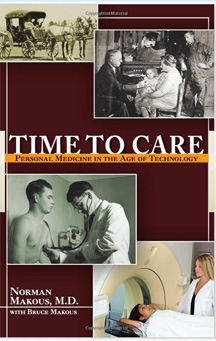September 24th, 2015 by Dr. Val Jones in True Stories
No Comments »
 My newly admitted patient was at the end of a very long struggle with a devastating genetic disorder. He had been treated by some of the finest experts in America for his rare disease, and had come to my rehab unit for aggressive physical and occupational therapy. He was exhausted, but mustered the energy to tell me (probably the 100th physician to treat him) his complicated story.
My newly admitted patient was at the end of a very long struggle with a devastating genetic disorder. He had been treated by some of the finest experts in America for his rare disease, and had come to my rehab unit for aggressive physical and occupational therapy. He was exhausted, but mustered the energy to tell me (probably the 100th physician to treat him) his complicated story.
Listening to this man, and examining his frail body, I realized that he had already explored every treatment option and avenue available. He had extensive conversations about his genetic variant, and which drugs could possibly modify his course. He had tried pretty much everything once, with little improvement. He told me that the team of experts at my hospital were rallying to repeat some of the costly treatments that had failed previously, to see if maybe this time they could make a difference.
As our eyes met, I realized that we both knew that these treatments were not worthwhile. I could see that he didn’t want to be “non-compliant” with his physicians’ recommendations, and was reluctantly willing to give their plans a shot. I knew that he needed to hear that it was okay to say “no.”
I took in a deep breath and voiced what we both knew to be true – there was no further need for IV medication. Now was the time to make the most of the function he had, to get him home with family support, and to focus on enjoying life rather than fighting a disease.
The relief brought him to tears. I began to put his socks back on his cold feet. He asked if I could leave them off.
I joked with him softly, “I guess your feet just want to be free.”
He smiled and nodded.
I didn’t order any tests or treatments, I just stood next to him in the moment.
And sometimes, that’s what a doctor is supposed to do.
December 16th, 2013 by Dr. Val Jones in Opinion
No Comments »
 I am consistently bemused by those who recommend more rigorous or more pervasive standardized testing as the primary means for insuring physician quality. The vast majority of physicians have already passed through a complex gauntlet of multiple choice exams, extended credentialing and certification processes, and lengthy tests of knowledge and skill. And yet, some physicians (to put it bluntly, sorry friends) are very bad at what they do.
I am consistently bemused by those who recommend more rigorous or more pervasive standardized testing as the primary means for insuring physician quality. The vast majority of physicians have already passed through a complex gauntlet of multiple choice exams, extended credentialing and certification processes, and lengthy tests of knowledge and skill. And yet, some physicians (to put it bluntly, sorry friends) are very bad at what they do.
Intellectual intelligence is necessary, but not sufficient, for doctoring. It is emotional intelligence (EI) that is sorely lacking – because it has neither been cultivated, nor selected for, by many training programs. Some educators openly acknowledge the problem, pointing to “extra-curricular activities” as their primary means of distinguishing equally qualified applicants. The disappointing reality is that non-academic performance may be a tie-breaker for students with similar standardized test scores, but raw scores almost always trump any other factor. In the end, we have a physician work force that is highly adept at assimilating and regurgitating facts, but is only accidentally good at human interactions.
Is there hope for change in this arena? I believe that the prognosis is guarded. As our culture becomes more and more digital data-driven, a tsunami of “meaningless use” threatens to drown us all in false quality measures, electronic medical record documentation “quality assurance” requirements, and analysis of trends without comprehension of context or influencing variables outside the scope of the measuring instruments. Lies, damn lies, and statistics. We can’t get enough! And guess who are the biggest proponents of these methods? Why, people who only excel at standardized testing – mostly because their true flaws also lie outside the measuring instruments. Bad doctors (sometimes turned-administrators) themselves are often fueling the onslaught of fruitless quality improvement initiatives.
Dr. Howard Luks, orthopedic surgeon and social media activist, wrote a provocative blog post on the subject of why physicians don’t engage more in social media. He suggests that many avoid it because they lack people-skills in the first place and don’t genuinely enjoy engaging with patients. If you’re a “jerk” in real life, he argues, then what advantage is there to making that more obvious on blogs, Facebook, Twitter, etc.? Better to stay socially quiet.
The interesting thing is that social media might be the most reliable way to discover whether or not your doctor is kind, thoughtful, observant, and detail-oriented. Reading a physician’s thoughts online can help you get to know their true personality and work ethic. In the future it would be nice if medical schools and residency training programs took the time to read applicants’ blogs (for example) instead of crunching their test scores for admission via the path of least resistance. An extra hour of reading up front could save our medical system from a new wave of low EI providers.
As Seth Godin put it, “Uncaring hands are worth avoiding.”
We all recognize the importance of this statement intuitively, but have a hard time quantifying “caring” with standardized tests. That’s why admissions officers and patients alike must use their judgment when selecting doctors. We pay verbal homage to the importance of “clinical judgment” in medicine but in reality are culturally afraid of straying from numbers to support our decision-making.
How will you know a good doctor? You’ll know him [or her obviously] when you see him. And sometimes you can see him best on social media platforms.
***
A few caveats of course:
1. Social Media is a sensitive but not specific test. Meaning, you can probably accurately identify caring doctors from their blogs, etc. but if they don’t have one, it doesn’t mean they aren’t good/caring.
2. It may not matter if you find a great doctor online if they’re not in your limited ACA network. 😕
3. Direct primary care is a potentially excellent way to get connected to exceptional doctors. I am a fan of this movement and have been actively involved in a practice in VA. The practices can reduce costs and enhance quality care, though recent caps on Health Savings Accounts (initiated by the Obama administration) have reduced consumer freedom to spend pre-tax income on direct primary care.
February 18th, 2010 by Harriet Hall, M.D. in Better Health Network, Book Reviews
No Comments »

 In 1925, Francis Peabody famously said “The secret of the care of the patient is in caring for the patient.” A new book by Norman Makous, MD, a cardiologist who has practiced for 60 years, is a cogent reminder of that principle.
In 1925, Francis Peabody famously said “The secret of the care of the patient is in caring for the patient.” A new book by Norman Makous, MD, a cardiologist who has practiced for 60 years, is a cogent reminder of that principle.
In Time to Care: Personal Medicine in the Age of Technology, Dr. Makous tackles a big subject. He attempts to show how modern medicine got to where it is today, what’s wrong with it, and how to fix it. For me, the best part of the book is the abundance of anecdotes showing how medicine has changed since Dr. Makous graduated from medical school in 1947. He gives many examples of what it was like to treat patients before technology and effective medications were introduced. He describes a patient who died of ventricular fibrillation before defibrillators were invented, the first patient ever to survive endocarditis at his hospital (a survival made possible by penicillin), a polio epidemic before polio had been identified as an infectious disease, the rows of beds in the tuberculosis sanitariums that no longer exist because we have effective treatments for TB. Read more »
*This blog post was originally published at Science-Based Medicine*
 My newly admitted patient was at the end of a very long struggle with a devastating genetic disorder. He had been treated by some of the finest experts in America for his rare disease, and had come to my rehab unit for aggressive physical and occupational therapy. He was exhausted, but mustered the energy to tell me (probably the 100th physician to treat him) his complicated story.
My newly admitted patient was at the end of a very long struggle with a devastating genetic disorder. He had been treated by some of the finest experts in America for his rare disease, and had come to my rehab unit for aggressive physical and occupational therapy. He was exhausted, but mustered the energy to tell me (probably the 100th physician to treat him) his complicated story.












